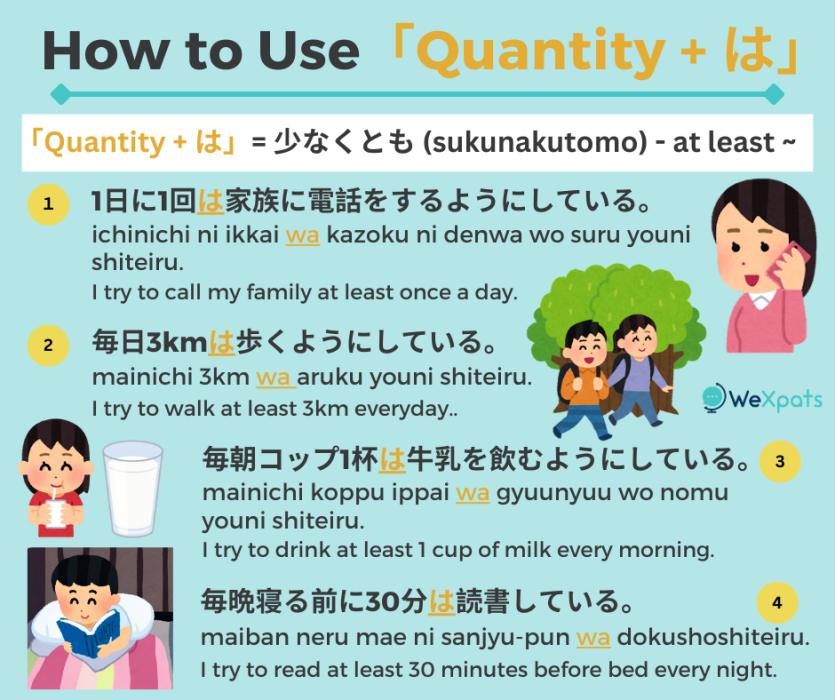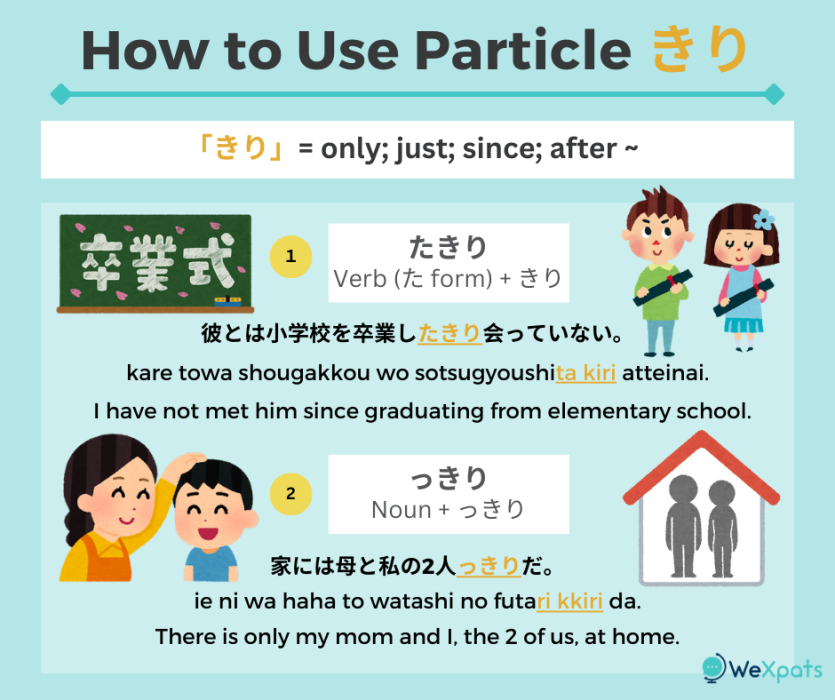Japanese particles include case particles (or case markers), parallel markers (or parallel particles), conjunctive particles, focus particles and compound case particles (or compound case markers).
In N4 Particles List, we explained Parallel Markers (並列助詞 Heiretsu Joshi) and Conjunctive Particles (終助詞 Shuu Joshi). This time, we will explain the usage and meaning of Japanese particles at the JLPT N3 level.
If you want to review the basic usage of Japanese particles, please check out the N5 Particles List.
Table of Contents
- N3 Particles - Focus Particles and Compound Case Particles
- N3 Particles List
- How to Learn N3 Particles Easily
- Things to be Aware of about N3 Particles
- Challenge the N3 Particles Quiz!
N3 Particles - Focus Particles and Compound Case Particles
At the JLPT N3 level, in addition to the basic particles learnt at the JLPT N5 and N4 levels, Focus Particles and Compound Case Particles will also appear in questions.
Not only does the number of particles to learn increase at the N3 level, but their usage also becomes more difficult, so remember them well.
取り立て助詞 (toritate joshi) - Focus Particles
Focus particles add special meaning to words in a sentence. While case markers are particles that create structure in a sentence, focus particles are particles that decorate and add meaning to a sentence.
Focus particles include particles to indicate:
- Subject or Contrast : は (wa) and なら (nara).
- Addition and Enumeration : も (mo)
- Limitation : だけ (dake), しか (shika), ばかり (bakari), こそ (koso)
- Extreme Examples : さえ (sae), まで (made), でも (demo)
- Evaluation : なんか (nanka), なんて (nante), くらい (kurai)
At the JLPT N3 level, focus particles こそ (koso), さえ (sae), なんか (nanka), なんて (nante), など (nado) and くらい (kurai) appear. Let’s look at their meaning and usage.
「こそ (koso)」: (for sure (emphasis preceding work); precisely; definitely ~)
Usage:
Noun + こそ
Example Sentence:
明日こそ早起きしたい。
(ashita koso hayaoki shitai)
- Tomorrow for sure, I want to wake up early.
「さえ (sae)」: (even; so much as; not even)
Usage:
Noun + (で) さえ (も)
Example Sentence:
子どもでさえその字は読める。
(kodomo de sae sono ji wa yomeru)
- Even a child can read this word.
「なんか (nanka)」、「なんて (nante)」、「など (nado) 」: (give examples; show modesty; make light of ~)
Usage:
Noun + なんか / なんで / など
Example Sentence:
-
私の英語力なんか彼にはまだ及ばない。
(watashi no eigoryoku nanka kare ni wa mada oyobanai)
- My English skills are still no match for him. -
うわさなんて信じない。
(uwasa nante shinjinai)
- I don’t believe in things like rumours. -
休みの日も予定があり家にいる時間などない。
(yasumi no hi mo yotei ga ari ie ni iru jikan nado nai)
- I have plans even on my days off, so I don’t have time for things like staying at home.
「くらい (kurai)」 / 「ぐらい (gurai)」: (approximately; about; around; to the extent ~)
Usage:
- Verb (casual form) + くらい / ぐらい
- Noun + ぐらい
- Na-Adjective + な + くらい / ぐらい
- I-Adjective + くらい / ぐらい
Example Sentence:
-
イベントの参加者は50人ぐらいだ。
(ibento no sankasha wa gojyuu-nin gurai da)
- The event has around 50 participants. -
犬は猫と同じくらい可愛い。
(inu wa neko to onaji kurai kawaii)
- Dogs are as cute as cats.
複合格助詞 (fukugou kaku joshi) - Compound Case Particles
Basic case particles (or case markers) are used to form the structure of a sentence. Compound case particles work the same way - to form the structure of a sentence, but they are more complex as they are made up of multiple words.
Compound case particles can express objects, positions, places, methods, other parties, purposes, roles, etc. There are many compound case particles with a wide range of meaning and usages, so memorise them little by little.
Below we explain compound case particles at the N3 level.
「として (toshite)」: indicates role (as; in the role of ~)
Usage:
Noun + として
Example Sentence:
彼女は母親として子育てを一生懸命がんばっている。
(kanojo wa hahaoya toshite kosodate wo isshoukenmei ganbatteiru)
- She is trying her best as a mother to raise her children.
「について (ni tsuite) 」: indicates object or movement (concerning; regarding; about; on~)
Usage:
Noun + について
Example Sentence:
私は大学で日本文化について勉強している。
(watashi wa daigaku de nihon bunka ni tsuite benkyoushiteiru)
- I am studying (about) Japanese culture at university.
「にとって (ni totte)」: indicates perspective・position (to; for; concerning; as far as … is concerned; regarding ~)
Usage:
Noun + にとって (は / も)
Example Sentence:
妹にとってぬいぐるみは宝物だ。
(imouto ni totte nuigurumi wa takaramono da)
- As far as my sister is concerned, stuffed toys are her treasures.
N3 Particles List
At the JLPT N3 level, many particles are memorised not as a single word, but as a set with words that come before and/or after. Understanding what these particles mean will also help in reading long passages.
Let’s learn the meaning and usages of these particles to prepare for the JLPT examinations.
|
Particle |
Meaning |
How to Use |
Example Sentence |
|---|---|---|---|
|
いくら~ても |
no matter how ~ |
いくら+Verb (ても form) |
いくら眠っても疲れがとれない。 いくら高くても価値のあるものは欲しい。 |
|
から〜にかけて |
through; |
Noun(A)から |
今日から明日にかけて雨が降るそうだ。 |
|
きり |
only; just; |
Verb (た form)+きり |
彼女とは一度話したきり会っていない。 家には母と私の2人っきりだ。 |
|
くせに |
and yet; though; |
Verb (dictionary form)+くせに |
彼はお金持ちのくせにあまり買い物をしない。 |
|
くらい / ぐらい |
approximately; about; |
Verb (casual form)+くらい / ぐらい |
イベントの参加者は50人ぐらいだ。 犬は猫と同じくらい可愛い。 |
|
こそ |
for sure (emphasise |
Noun+こそ |
明日こそ早起きしたい。 |
|
こと |
(must) do |
Verb (dictionary form)+こと |
仕事を休む時は必ず上司に連絡すること。 家を出るときは鍵を忘れないこと。 |
|
さえ |
even; so much as; |
Noun+(で)さえ(も) |
子どもでさえその字は読める。 |
|
さえ~ば |
if only; as long as ~ |
Verb ます (stem form) |
この電車に乗りさえすれば目的地まで |
|
しかない |
have no choice |
Verb (dictionary form)+ |
傘を忘れてしまったのでコンビニで買う |
|
たって |
even if; |
Verb (casual, た form)+ |
今から走ったって電車には間に合わない。 |
|
たものだ |
used to do; |
Verb (た form)+ものだ |
子どものころはよく親に𠮟られたもの |
|
っけ |
a casual suffix to |
Noun + (だ / だった)+っけ |
テストの日はいつだったっけ? 駅はこんなに遠かったっけ? |
|
といい / たらいい |
it would be nice if; |
Verb (casual) + と+いい |
私のことを覚えているといいな。 また今度話せたらいいな。 |
|
として |
as; in the role of ~ |
Noun+として |
彼女は母親として子育てを一生懸命がんばっている。 |
|
とは限らない |
not necessarily so; |
Verb (casual)+とは限らない |
彼が試合に出場するとは限りません。 すべての子どもが甘いものが好きだとは限らない。 |
|
ながらも nagara mo |
but; although; |
Verb (て form) + い+ながら |
古いながらも居心地のいい家だ。 |
|
なんか / なんて / |
give examples; |
Noun+なんか/なんて/など |
私の英語力なんか彼にはまだ及ばない。 うわさなんて信じない。 休みの日も予定があり家にいる時間などない。 |
|
にしては |
for; considering it’s |
Verb (casual)+にしては |
あの子は小学生にしてはとても背が高い。 |
|
にしても |
even if; even though; |
Verb (casual)+にしても |
夜出かけるにしても9時までには帰ってきなさい。 |
|
について |
concerning; regarding; |
Noun+について |
私は大学で日本文化について勉強している。 |
|
にとって |
to; for; concerning; |
Noun+にとって(は/も) |
妹にとってぬいぐるみは宝物だ。 |
|
には |
for the purpose of; |
Verb (dictionary form)+には |
学校が完成するにはまだ時間がかかる。 |
|
ばいい |
should; can; |
Verb (ば conditional form)+いい |
学校までどうやって行けばいいですか? |
|
ば~のに |
would have; |
Verb (conditional form)+のに |
このお菓子、もっと量が多ければ買うのに。 テストが簡単ならよかったのに。今回はとても難しかった。 |
|
ば~ほど |
the more… the more ~ |
Verb (ば conditional form)+ ほど |
スポーツは、練習すれば練習するほど上手になる。 駅に近ければ近いほど通勤に便利だ。 |
|
は別として |
aside from; |
Noun+(かどうか)+は別として |
テストの結果は別として、よく頑張ったと思う。 雨かどうかは別として、皆でイベントを楽しみたいです。 |
|
ほど |
degree; extent; |
Verb (casual, non-past)+ほど |
私の父は休む暇がないほど忙しい人です。 今日ほど寒かった日はなかった。 |
|
ほど~ない |
is not as… as ~ |
Noun + ほど+Verb (ない form) |
日本語のカタカナは漢字ほど難しくありません。 キリンほど背の高い動物はいない。 |
|
も~ば~も |
and; also; as well; |
Noun(A)+ も+Verb (ば form) |
彼女はスポーツもできれば勉強もできる。 |
|
もしも〜たら |
if; in the case; |
もしも+Verb (た form) + ら |
もしも休暇があったら、海外旅行に行きたいです。 |
|
よりも |
in comparison to; |
Verb (casual)+よりもNoun+よりも |
外出するよりも家で過ごす方が好きだ。 私は見た目よりも性格を重視する。 |
|
【数量】 + は |
at least ~ |
数量 (quantity; volume; amount)+は |
毎日30分間は会話の練習をするようにしています。 |
How to Learn N3 Particles Easily
At the N3 level, the particle は (wa) can be used as「Quantity + は」to mean ”少なくとも (sukunakutomo) - at least ~”. It is often used to express a habit or action that you are mindful of. Note that the usage of the particle は (wa) in this case is different from the は (wa) that connects to a subject noun, such as「私は (watashi wa) - I am」.

As for the N3 level particle「きり (kiri) - only; just; since; after ~)」, it has the meaning of limiting the scope of the word it is attached to. It is also used to explain the limited range of situations from the point between after きり comes into place and the present.
When attached to a verb, the formula is presented as「Verb た Form + きり」. And when attached to a noun, it is 「Noun + っきり」- be careful not to miss out the small っ.

Things to be Aware of about N3 Particles
Some Japanese particles carry negative connotations. Be careful when using it in conversation as it may make your conversation partner uncomfortable.
くせに (kuseni)
くせに is an expression used to judge, criticise, or insult someone based on your own prejudices. It is not malicious and can be used in a slight teasing manner. This is a casual expression so avoid using it in business settings and formal conversation.
Usage:
- Verb (dictionary form) + くせに
- Noun + の + くせに
- Na-Adjective + な + くせに
- I-Adjective + くせに
Example Sentence:
-
本当は悲しいくせに彼女は強がって泣かないようにしている。
(hontou wa kanashii kuseni kanojo wa tsuyogatte nakanai youni shiteiru)
- Even though she is sad, she is forcing herself not to cry. -
子どものくせに大人と同じテレビ番組を見たがる。
(kodomo no kuseni otona to onaji terebi bangumi wo mitagaru)
- Even though they’re children, they want to watch the same TV programmes as adults.
ば~のに (ba~noni)
ば~のに is used to express regret or dissapointment. のに at the end of the sentence is used to express dissatisfaction or desire for something unattainable.
Usage:
- Verb (ば conditional form) + のに
- Noun + なら + のに
- Na-Adjective + な + のに
- I-Adjective + ければ + のに
Example Sentence:
-
もっと時間があればいっぱい遊べたのに。
(motto jikan ga areba ippai asobeta noni)
- If only I had more time, I could have played more. -
駅が近ければもっと便利なのに。
(eki ga chikakereba motto benri na noni)
- If only the station was nearer, it would be more convenient. -
自分の意見を言えばよかったのに。
(jibun no iken wo ieba yokatta noni)
- If only I had expressed my own opinions.
Challenge the N3 Particles Quiz!
Let’s try answering these JLPT N3 Particles example questions.
問題:( )に入る助詞はどれですか。1・2・3・4の中から最もよいものを一つえらんでください。
① いくら安く( )、気に入らないものは買わないようにしている。
1.て 2.ても 3.って 4.で
② 昨日から今日に( )雨が降り続いている。
1.ついて 2.おいて 3.かけて 4.しては
③ 人と話せば話す( )会話が上手になります。
1.から 2.と 3.には 4.ほど
④ 駅から会社までどうやって行け( )いいですか?
1.ば 2.たら 3.と 4.かも
【Quiz Translation and Answers】
Check how you did in the short quiz!
問題:( )に入る助詞はどれですか。1・2・3・4の中から最もよいものを一つえらんでください。
(mondai: ( )ni ireru joshi wa dore desuka。 1・2・3・4 no naka kara motomo yoi mono o hitotsu erande kudasai)
- Which particle should be used to fill in( )? Choose the best from 1・2・3・4 .
① いくら安く(2. ても)、気に入らないものは買わないようにしている。
(ikura yasuku temo, ki ni iranai mono wa kawanai you nishiteiru)
- No matter how cheap it is, I endeavour not to buy anything I don’t like.
② 昨日から今日に(3. かけて)雨が降り続いている。
(kinou kara kyou ni kakete ame ga furitsuzuiteiru)
- The rain continues to fall from yesterday to today.
③ 人と話せば話す(4. ほど)会話が上手になります。
(hito to hanaseba hanasu hodo kaiwa ga jyouzu ni narimasu)
- The more you talk to people the better you will get at conversing.
④ 駅から会社までどうやって行け(1. ば)いいですか?
(eki kara kaisha made douyatte ikeba ii desuka?)
- How should I get to the station from here?
Quiz Answers: [2], [3], [4], [1]
































